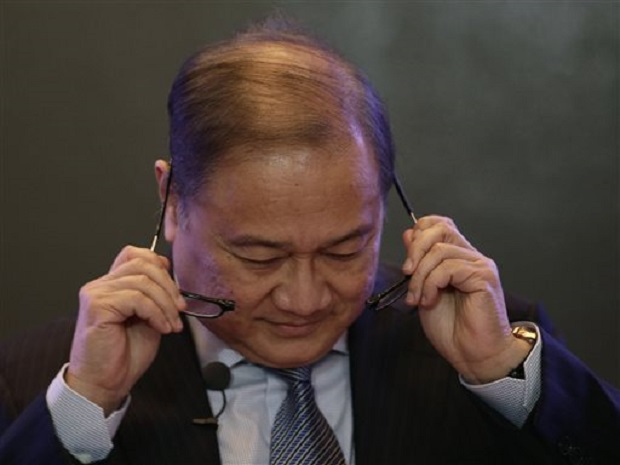It’s been a rough week for Philippine Long Distance Telephone Co. (PLDT) and its shareholders. Its full-year 2015 results were ahead of expectations, but its forecast for the next few years was far from rosy, with the telco landscape changing, apart from existing and new competition.
There was also an unusual amount of candor in Monday’s briefing. This was PLDT chair Manuel V. Pangilinan’s first in a long time as CEO since Napoleon Nazareno retired last December. Pangilinan said core profit in 2016 would sink to P28 billion—an area it hasn’t treaded in more than a decade.
Apparently, pressure to continue showing growth has been mounting since PLDT’s income peaked at P42 billion in 2010.
“We have managed to maintain a significant profit level for the group despite the changing circumstances of the business, and I think that was a fault of ours as well,” Pangilinan said in a stunning admission. “If we continue to produce the profits, produce the cash, then we might obsolete ourselves.”
PLDT remains one of the country’s most profitable companies—its investors and investments depend on this. Yet, its top executive said this mindset was doing more harm than good.
Pangilinan said the need to cut this pressure, to the tune of P7 billion in 2016 if you assumed PLDT wanted to match last year’s core profit of P35 billion, would give PLDT’s management “breathing space” to properly execute “painful” reforms confronting its business.
We’re certain the decision to move in this direction was a difficult one and PLDT did the right thing in being extra transparent about it. It came at a great price, though, with its share price down more than fifth in the last two days. That’s about P102 billion wiped off its market value.
Those investing in the telco now should be doing so for the long-haul. As Pangilinan put it, PLDT will be a “totally different company two or three years from today.” Miguel R. Camus
PLDT buyback?
ALL businesses of the First Pacific group led by businessman Manuel V. Pangilinan aka MVP are likely to do well this year, with or without regulatory constraints. Well, all except for one, MVP had pointed out, referring to telecom giant Philippine Long Distance Telephone (PLDT) whose shares slid by nearly 18 percent on Monday and 4 percent on Tuesday.
The bloodbath happened after MVP projected that it would take three years for the company to “make a U-turn” or arrest the earnings downtrend. “But it still is the biggest, most profitable company in the Philippines as far as I know,” he said.
Is PLDT willing to buy back its own shares to help protect shareholder value? MVP said this had not been discussed at the boardroom so far, noting it would probably depend on where the share price of PLDT would settle.
Citing the First Pacific group’s experience with stock buybacks, MVP said this would normally not work over the long run. “You really can’t fight the market… There’s not much you can do,” he told a briefing.
Having said that, however, MVP said he was “not ruling out” such buybacks for PLDT. Doris Dumlao-Abadilla
No underpayment
NO LESS than the president of University of the Philippines system Alfredo Pascual on Tuesday cleared property giant Ayala Land Inc.—developer of the UP Town Center (UP Diliman East Campus) and Science and Technology Park (Technohub)—of any alleged underpayment of rental obligations to the premier state university.
Speaking to business reporters at the turnover of the new UP BGC campus building donated by the SM group, Pascual said the Commission on Audit’s reports were at times questionable. At the beginning of his term, he noted that the COA had claimed the rental money for Technohub was unaccounted for. “I was surprised because the money was intact with Landbank,” he said.
This allegation of underpayment, Pascual explained, was due to differences in how to interpret the contract between ALI and the UP system. “They are looking at the annex, we’re looking at the text,” he said. “How can you expect a renter to pay for a place that hasn’t been turned over?”
In its audit report on the UP system for the year 2014, the COA issued a “qualified opinion” on the property deals with ALI, alleging that for UP Town Center, there was P129 million or 21 percent “underpayment” compared to the projected/secured rental revenues. Likewise alleged was the non-imposition of the interest of 24 percent a year for the late rental payments of at least P4.24 million for the “delays” covering the rental period from October 2013 to July 2014, plus the additional interest for the “underpayment” of P129 million.
For Technohub, the COA claimed there was an understatement of the rental income by at least P76 million “plus the undetermined amount from the hotel and building leases.” It also estimated an unbilled or uncollected interest at 24 percent a year of at least P3.06 million for delayed payments for the period January 2013 to November 2014, plus interest on the “underpayment.”
Suffice to say, Pascual stated that “Ayala is paying what’s contracted.” Doris Dumlao-Abadilla
E-mail us at bizbuzz@inquirer.com.ph. Get business alerts and a preview of Biz Buzz the evening before it comes out. Text ON INQ BUSINESS to 4467 (P2.50/alert).


